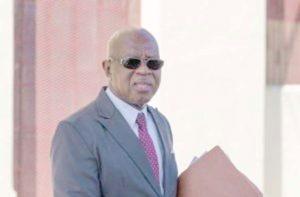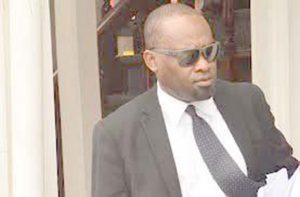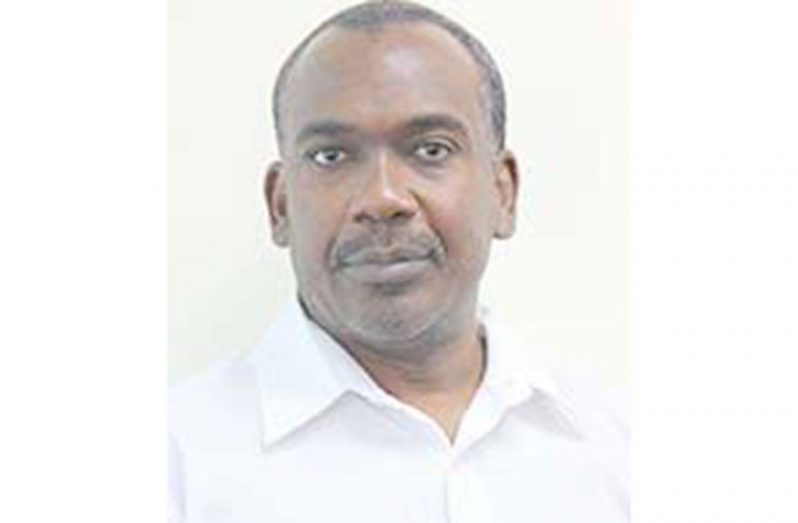-legal luminaries argue as they make case for PPP/C’s application to be refused
–call out the party for misleading Court on Elections Report
ARTICLE 177 (4) of the Constitution of Guyana and the Caribbean Court of Justice Act have undeniably ousted the jurisdiction of the Caribbean Court of Justice (CCJ) from adjudicating on any decision made by the Court of Appeal under that article, and, as such, the application by the People’s Progressive Party/Civic (PPP/C) for special leave to appeal the Court of Appeal’s decision that the election of a President must be on the basis of valid votes, ought to be refused.
That was the main line of argument put forward by a battery of lawyers representing North Sophia voter, Eslyn David – the first named respondent in a case filed by PPP/C’s General Secretary, Bharrat Jagdeo and its Presidential Candidate, Irfaan Ali, before the CCJ.
Assuming jurisdiction in a case brought by David on June 18, 2020, the Court of Appeal had ordered that the words “more votes are cast” in Article 177 (2) (b) of the Constitution be interpreted to mean “more valid votes are cast” but the PPP/C wants the Appellate Court’s decision to be set aside by the CCJ.
However, the legal luminaries representing David – John Jeremie SC, Roysdale Forde SC,
Mayo Robertson, Keith Scotland, Timothy Affonso and Rondelle Keller – said there is no room for an appeal, even as they sought to set the record straight on the Elections Report submitted by the Chief Elections Officer, Keith Lowenfield following an attempt by the PPP/C to mislead the Court. 
In their written submission to the CCJ, on Sunday, the lawyers from the onset indicated that the relief sought in David’s Notice of Motion for the interpretation of Article 177 (2) (b) fell squarely within the jurisdiction of the Court of Appeal (CoA) as provided in Article 177 (4). “The wording and operation of Article 177 (4) operate as a complete bar to any appeal to the CCJ. Once the CoA has exercised its jurisdiction pursuant to Article 177 (4), its decisions are final and cannot be subject to review except by the CoA similarly exercising powers under Article 177 (4),” the lawyers submitted.
Article 177 (4) of the Constitution confers on the Court of Appeal an exclusive, original constitutional jurisdiction “to hear and determine any question as to the validity of an election of a President in so far as the question depends upon the qualification of any person for election or the interpretation of this Constitution.” In handing down its ruling on Monday (June 22), the Court of Appeal, while referencing to the Eusi Kwayana’s Application (1980), as relied upon by the parties in the case, had said that the conditions laid out in the Article are disjunctive, and therefore not dependent on each other.
The CCJ, led by its President, Justice Adrian Saunders, on Thursday (June 25) had asked the intended appellants and respondents to address four primary issues in their submissions – whether the Court of Appeal had jurisdiction to entertain the Motion filed by David; if the Court of Appeal lacked jurisdiction, what is the consequence in respect of this proposed appeal; if the Court of Appeal rightly assumed jurisdiction, what is the consequence in relation to the proposed appeal; and if the Court of Appeal rightly assumed Jurisdiction, but they exceeded their jurisdiction, what is the consequence on the proposed Appeal.
The lawyers, in addressing the issues as identified by the CCJ, said given that the decision of the Appellate Court is final as indicated in Article 177 (4), there can be no determination by the Caribbean Court even if there were errors in the application of law or excess of jurisdiction.
“The Court of Appeal is a superior court of record. Even if the Court of Appeal exceeded its jurisdiction…the CCJ has no jurisdiction to review the Court of Appeal’s final Article 177 (4) decisions. As a consequence the intended appellant’s application for special leave ought to be dismissed,” the attorneys submitted.
They said that contrary to the submissions made by Trinidad’s Senior Counsel Douglas Mendes, who is representing Jagdeo and Ali, the Court of Appeal did not set as its primary objective the interpretation of Order 60. Order No. 60, was the legal tool used by the Guyana Elections Commission (GECOM) in accordance with Article 162 of the Constitution and Section 22 of the Elections Law Amendment Act, to facilitate a National Recount so as to determine a final credible count.
The battery of lawyers led by Jeremie clarified that the Court of Appeal considered the Order so as to determine what a “vote” meant in the context of the Constitution and the Electoral Laws of the country. Noting that the Court could not have interpreted Article 177 (2) (b) in a vacuum, the attorneys pointed to Oliver Jones, Bennion on Statutory Interpretation and HRH Prince Ernest Augustus of Hanover (1957) in support of their arguments.
“It is submitted that this well settled approach was adopted by the Court of Appeal in its analysis of the Representation of the People Act; the Election Laws Act and Order 60 of 2020 all of which together with the Constitution itself elucidated on the meaning of the expression “vote” in Article 177 (2) (b),” David’s attorneys argued.
SEPARATE LEGAL REGIME FOR ELECTION OF THE PRESIDENT
As indicated by High Court Judge, Justice Brassington Reynolds, who had formed part of the panel of judges at the Court of Appeal, David’s lawyers said there is a clear distinction between the jurisdiction of the Court of Appeal as outlined in Article 177 (4) and the jurisdiction of the High Court under Article 163 with respect to the validity of the elections.
It was explained that Article 163 and the National Assembly (Validity of Elections) Act could only lead to the invalidation of a person elected to the National Assembly. The lawyers were keen on pointing out that the President does not form part of the National Assembly, and as such, the validity of the election of any person to the Office of the President cannot be determined under Article 163. Such could only be done under Article 177(4).
The attorneys also rejected Mendes’ contention that Article 177 (4) could only be invoked following the declaration of the result of the election. Such a move, they warned could lead to an absurd result with unintended consequences.
Further to that, it was submitted that the ouster clause in Article 177 (6), which is triggered after the election, clearly demonstrates why Article 177 (4) provides for questions as to validity of an election to be raised before the Chairman of GECOM declares the election of a President.
“A constitution is not interpreted to have its provisions collide with each other, especially when that would make a mockery of both Article 177 (4) and Article 177 (6),” they submitted.
They added: “Article 177 (4) does not require a completed election of a President in order for the Court of Appeal’s jurisdiction to be invoked to interpret the Constitution particularly in relation to matters concerning the election of a President. There is simply no qualification placed on the jurisdiction of the Court of Appeal other than that it must concern issues related to the election of a President. The Court of Appeal may interpret the Constitution at any time upon an application by anyone in this regard. The Court of Appeal has done so here.”
On that as the basis of their arguments, the batteries of lawyers said it is clear that there can be no appeal to the CCJ with regards to matters determined under Article 177 (4) of the Constitution, and again lobbied the CCJ to refuse the application for special leave filed by Ali and Jagdeo.
VALID VOTES AND THE CEO’S REPORT
Outside of their arguments on jurisdiction and the interpretation of the Constitution, the batteries of lawyers led by Jeremie contended that Ali and Jagdeo, through their attorneys, were dishonest in their submission to the CCJ with regards to the Chief Elections Officer’s Election Report.

Mendes, in his submissions, had contended that the CEO on June 13 had produced a report, in which he described all votes as valid votes, but this Jeremie said is far from the truth.
The contention by the intended appellants is simply “erroneous,” Jeremie and his team argued, while pointing to the fact that the Chair of GECOM, Justice (Ret’d) Claudette Singh, on June 16, had instructed the CEO to produce an Elections Report no later than June 18. That report, however, was submitted on June 23, 2020 due to legal proceedings which had effectively blocked the CEO from submitting it earlier.
Mendes, in his submission, also accused the CEO of engaging in fraudulent practices, even as he pointed fingers at the Region Four Returning Officer (RO), Clairmont Mingo; but Jeremie, in rejecting the contention, made known that the Court or any other empowered authority has not found the CEO or the Returning Officer guilty of any such illegal act.



.jpg)








